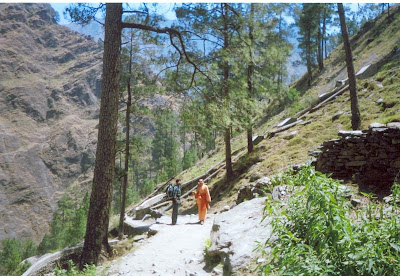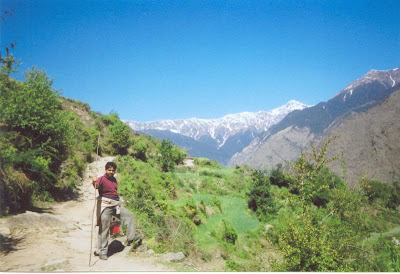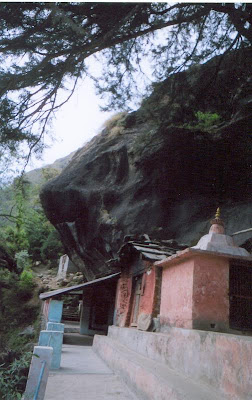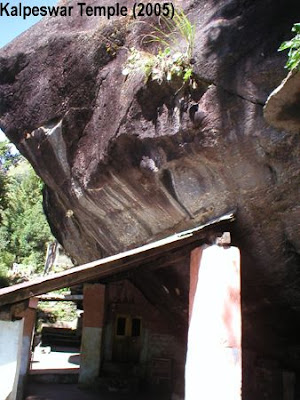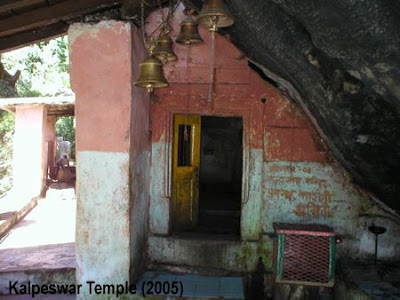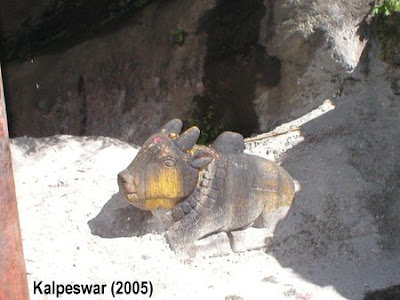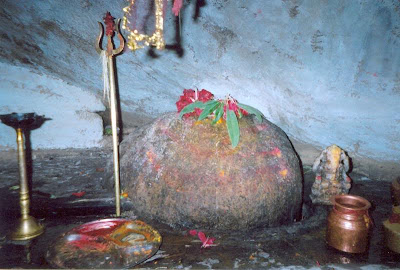| Om Sai Ram ! Kedar (Sanskrit: पंचकेदार) refers to five Hindu temples or holy places of the Shaivite sect dedicated to god Shiva. They are located in the Garhwa Himalayan region in Uttarakhand, India. They are the subject of many legends that directly link their creation to Pandavas, the heroes of the Hindu epic Mahabharata The five temples designated in the strict pecking order to be followed for pilgrimage for worship are the Kedarnath (Sanskrit: केदारनाथ) at an altitude of 3,583 m (11,760 ft), the Tungnath (तुंगनाथ)(3,680 m/12,100 ft), Rudranath (रुद्रनाथ) (2,286 m/7,500 ft), Madhyamaheshwar (मध्यमहेश्वर) or Madmaheshwar (3,490 m/11,500 ft) and Kalpeshwar (कल्पेश्वर) (2,200 m/7,200 ft). Kedarnath – 1st Panch Kedar Kedarnath, at the head of the Mandakini River, is amongst the holiest pilgrimages for the devout Hindu. The temple, believed to be very ancient, has been continually renovated over the centuries. The lingam at Kedarnath, unlike its usual form, is pyramidal and is regarded as one of the 12 Jyotirlingas. Situated at an altitude of 3,581 mts. Kedar is another name of Lord Shiva the protector and the destroyer. Shiva, is considered the embodiment of all passions-love, hatred, fear, death and mysticism that are expressed through his various forms Kalpa Vriksha (Jyotir Math) - wish fulfilling tree of this age. The first Shankaracharya (Adhi Shankara) attained enlightenment under this tree at the age of 16 Valley of flowers Trishul Nandi Devi (7816 meters) Chaukamba Devi Rudraprayag Bhagirathi Tungnath - 2nd Panch Kedar [ On the way to Tungnath temple] Set on the crest of a hill at an altitude of 3,886 meters, Tungnath is the highest temple in India. Legend has it that the arm of Shiva appeared here. Ravana, of the Ramayana, is said to have performed penance at this temple to propitiate Shiva. The high altitude temple is a Seat of Swyambhu Linga or the Lord Shiva Incarnate. The temple, one of the Panchakedars or one of the five Shiva temples, is situated in Chamoli district of the Uttarakhand region. Final steps to reach the Tungstan temple Rear view of the Tungnath temple The mythology has it that Lord Shiva was enraged at the act of homicide enacted by the Pandavas by killing their brethren in the grand battle of Mahabharata. Aware of Shiva's annoyance, the Pandavas built the temple to please Lord Shiva and for their own salvation. Others claim that the Adi Shankaracharya during his historic visit to the region had got it built. They cite the presence of Adi Shankaracharya's image in the garbha-griha or the sanctum of the temple. However, it also houses images of the Pandavas. Besides, the ashtadhatu images of Kaal Bhairava and Veda Vyasa are among the multitude of images there. A dark left-tilting one-foot high linga is the centre of attraction. The locals describe it as an arm of Lord Shiva. The arm of Lord Shiva is also associated with a legend. Tunganath Temple at 12,400 Ft Other temples Built of stone, this temple is a fine model of ancient architecture. Facing the gate of the temple is Nandi, the Divine Bull and Shiva's vehicle. There are two smaller temples dedicated to Parvati and Vyas in a small courtyard. The temple of Tungnath, at a little over 12, 000 feet, is the highest shrine on the inner Himalayan range. It lies just below the Chandrashila peak My Heartfelt pranams to Lord Shiva in Tungnath temple Path to Rudranath Temple-14 300 Ft Rudranath – 3rd Pancha Kedar The face of Lord Shiva is worshipped at Rudranath temple in a natural rock temple as Neelkantha Mahadeva. Lord Shiva is worshipped here as Neelkantha. The temple is situated amid thick forest at a height 2286 mtrs. From Gopeshwar 4 kms drivable road is available upto village Sagar from where 20 kms. trek leads to Rudranath and can be approached from Joshimath as well, by trekking about 45 kms. The temple provides magnificent view of Hathi Parvat , Nandadevi, NandaGhunti, Trishuli and many other. There are numbers of holy Kunds (Tanks) near Rudranath temple namely Suryakund, Chandrakund, Tarakund etc. The Baitarini, the divine river flows pass behind the temple. Anusuya Devi temple is located on the trek to Rudranath involving an additional trek of 3km. Rudranath shrine : This is the only temple in India where the image of Shiva is worshipped as a symbol of his face, a sublime, tender aspect of Shiva, unusual, serene and beautiful indeed to behold.Devotees come to Rudranath to offer ritual obeisance to their ancestors, for it is here, at Vaitarani river (the water of salvation), that the souls of the dead cross when changing world. Guptakashi temple:Kashi is the old name for Varanasi and "gupta" means secret or hidden. Guptakashi has an ancient temple of Shiva and derives its name from the fact that this is the place where Shiva is supposed to have hidden himself when the Pandavas chased him. At this place he disappeared and hid himself in a cave. Hence this place is known as Guptakashi or the "hidden Kashi". Entrance to kalimath.Kalimath is situated close to Ukhimath, and Guptakashi. It is one of the "Siddha Peeths" of the region and is held in high religious esteem. The temple of Goddess Kali located here is visited by a large number of devotees round the year and specially during the "Navratras". My heartfelt pranams to the idol at Kailmath temple Chandi Devi Temple : Legend goes that the Goddess Chandi Devi was sitting on a rock, combing her hair when two demons that were the servitors of the two brothers Shumba and Nishumba saw her and were totally captivated by her intoxicating beauty. They ran back to their masters and reported the matter to them. The whole story is narrated in the Devi Mahatmyam. The rock on which she was sitting is close to this temple. Ransi temple on the way to Madhyamaheshwar 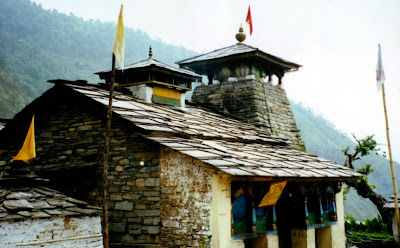 Nandi Kund The stomach of Shiva is believed to have emerged at Madmaheshwar. The temple of Madmaheshwar is located at an altitude of 3,289 m. above sea level, on the slope of a ridge, 25 km northeast of Guptakashi. There is a motorable road from Guptakashi to Kalimath. The best statue of Har Gauri in India measuring over a metre high is found in the Kali temple. The trek from Kalimath to Madmaheshwar is distinguished by wild unparalleled scenic beauty and engulfed by Chaukhamba, Kedarnath and Neelkanth peaks. Gaundar at the confluence of Madmaheshwar Ganga and Markanga Ganga, is the last settlement before one reaches Madmaheshwar. Located at the base of Chaukhamba peak at an altitude of 3289 m the classic temple architecture belongs to the North-Indian style. So sanctified is the water here that even a few drops are considered sufficient for ablution. The natural scenery is dramatically wild, with deep gorges & valleys, mountain sides flung upwards towards the skies, the forests where the snow lies thick in winter, only to be replaced by a carpet of greenery in the summer. Kedarnath & Neelkanth peaks are visible from here, the entire ring of mountains associated with the life & times of Shiva. The confluence of Madmaheshwar Ganga just short of the temple, is one of the prettiest spots in the region. Har-Parvati at Madhyamaheshwara Lord Shiva-(Dakshina murti) at Madhyamaheshwara The hardier tourist may like to trek about 35 km to Kalpeshwar, where the locks (hair) and head, of Lord Shiva are worshipped as JATADHAR. Located in Urgam Valley at an altitude of 2,134 m. above sea level, the temple is a further 10 km trek from Rudranath to Helong, the motor head on Rishikesh-Badrinath route. The small rock temple of Kalpeshwar is where the Hair appeared. Short of Kalpeshwar is the picturesque valley of Urgam. It is a favorite location of meditating sages. Legend has it that the sage Arghya had performed austerities here and created the nymph, Urvashi. Rishi Durvasa is also believed to have meditated here under the wish-fulfilling tree, Kalpavriksha. The sage had given Kunti the boon that she could invoke any of the forces of nature and they would appear before her and grant whatever she desired. Known for his quick temper, Rishi Durvasa is often recalled in context of the incident when, along with several disciples, he visited Kunti's sons, while they were in exile. He indicated that he and his disciples expected food. There was not a grain to cook. Lord Krishna who appeared and miraculously solved the problem answered an anxious Draupadi's prayers My Heart felt pranams to the Panch kedars.May lord Shiva always guide us to the path that will lead us to his sacred feet. with peace of mind. Sai bhakt, Deepa H |

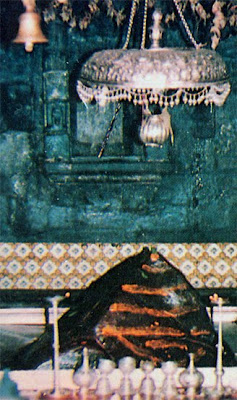
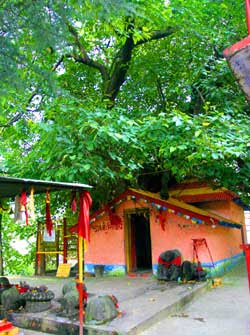



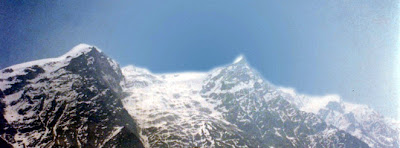
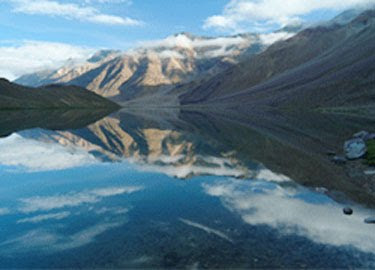
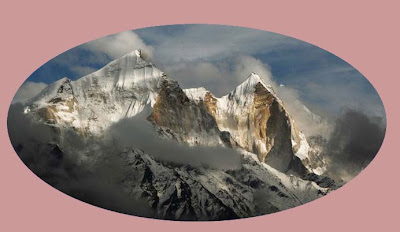

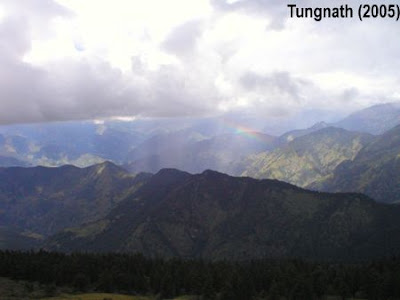
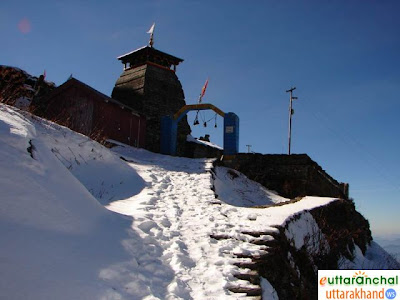
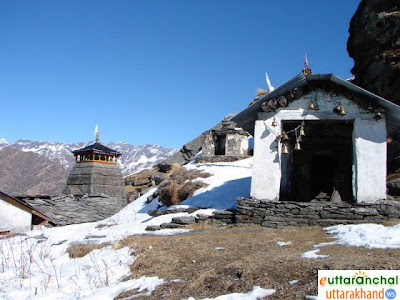
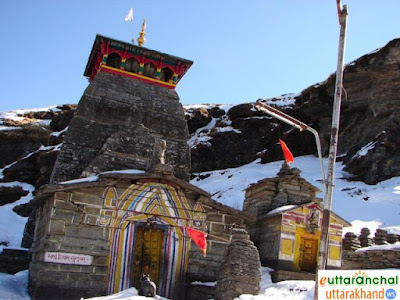
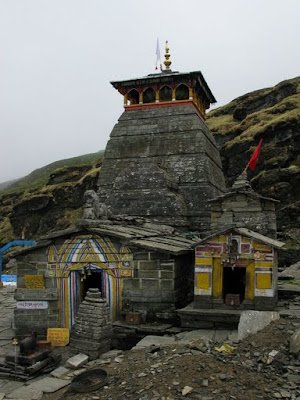
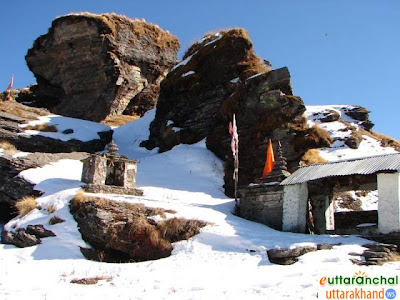

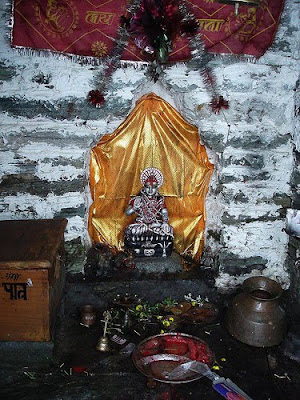



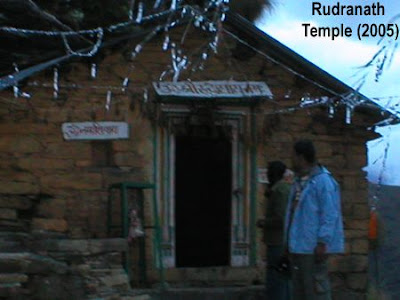
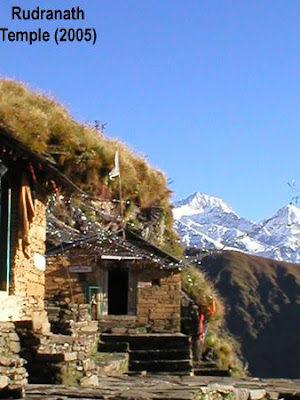
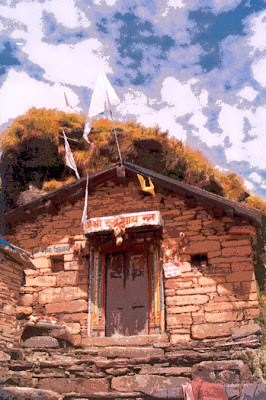
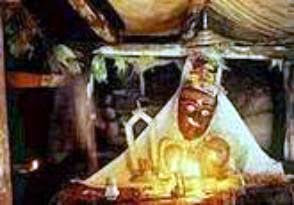
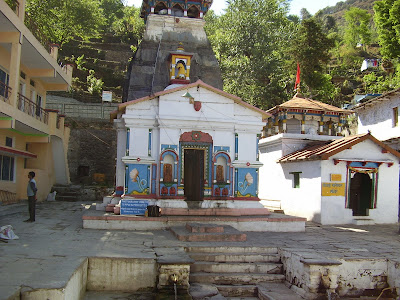
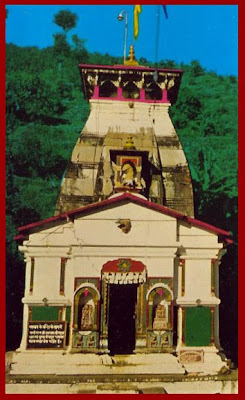
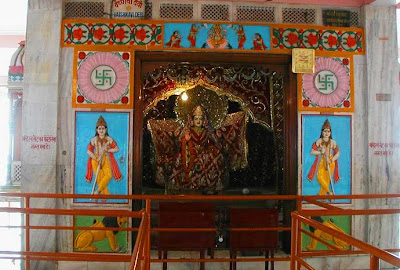

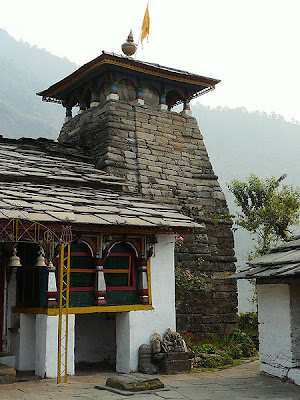


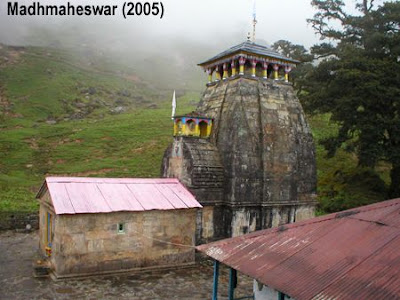
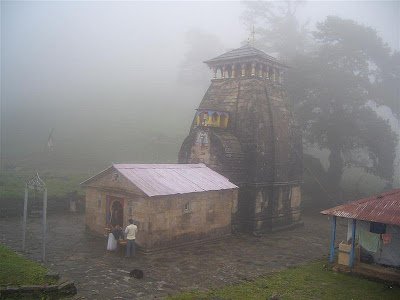
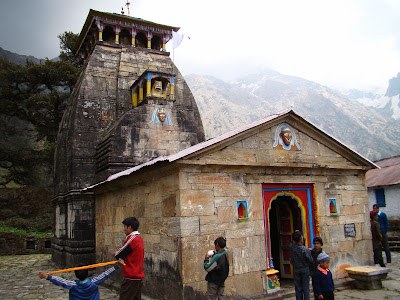

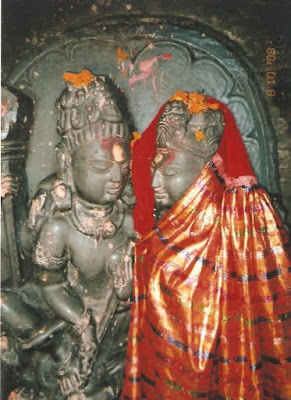
at+madhyamaheshwara.jpg)
